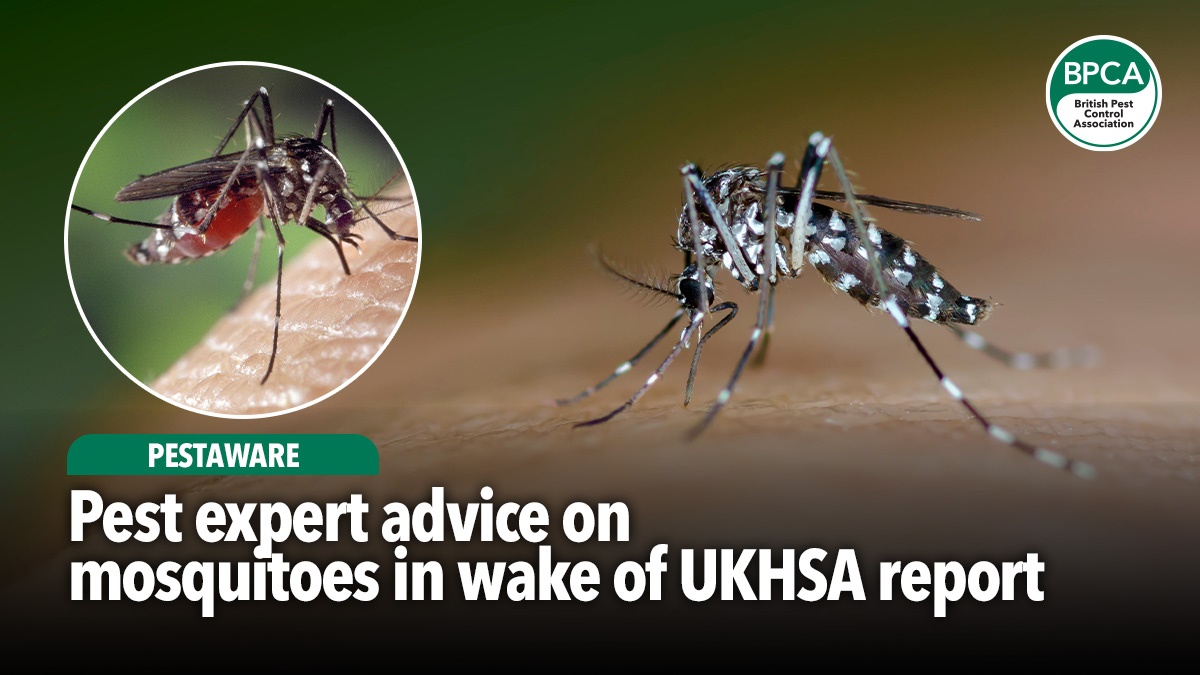PESTAWARE
National trade body, British Pest Control Association (BPCA), has issued advice to householders after two species of disease-carrying mosquitoes were found in the UK.

A report from the UK Health Security Agency (UKHSA) revealed eggs from the Egyptian mosquito (Aedes aegypti) were discovered for the first time in the UK in September 2023 in a surveillance trap at Heathrow Airport.
Asian tiger mosquito (Aedes albopictus) eggs were found for the first time since 2019 at a service station on the M20 in Kent in August 2024.
The two discoveries were followed by increased surveillance, but no further evidence was found at either location.
More than 300 mosquito surveillance traps are in place across England and Wales as part of UKHSA’s strategy to reduce the likelihood of invasive mosquitoes becoming established in the UK.
Niall Gallagher, Technical Manager at BPCA said: “The UKHSA’s findings are significant as both Egyptian and Asian Tiger mosquitoes are vectors of diseases including dengue fever, chikungunya and Zika virus, but the report makes it clear that there is no evidence that they have become established.
“The main issue with bites from native UK mosquitoes is that they can cause swelling and itchiness which causes some discomfort.
“In some cases, a reaction to the bite, or infection caused by scratching, can require further action and we would recommend checking advice on insect bites and stings at nhs.uk.
“Anyone concerned about a mosquito infestation can contact a BPCA member for help, but there are some simple steps people can take to nip a potential infestation in the bud.”
Female mosquitoes need a blood meal before they lay eggs, and most species will feed on humans, mammals and birds.
Water butts without lids, buckets, watering cans and even flower vases can harbour mosquito eggs which, once hatched, will become adults within a matter of days.
Some species of mosquito will emerge as early as February, with others emerging throughout the spring and remaining active through the summer to September or October, with a few lingering as late as November.
Female mosquitoes will shelter in sheds and garages over winter, having laid their eggs in standing water ready to emerge as the weather gets warmer.
To help prevent a mosquito infestation, BPCA advises householders to:
- Keep windows and doors closed at dawn and dusk, when mosquitoes are most likely to bite
- Use fly screens on doors and windows to prevent mosquitoes getting in
- Fit lids to water butts
- Make sure outdoor containers such as watering cans, paddling pools and buckets are emptied
- Clear stagnant water from garden troughs and bird baths
- If you find dead mosquitoes indoors clear them away quickly as they can become a food source for other indoor pests.
Niall added: “Anyone concerned about pest risk, or who suspects pest activity in their property, should seek professional help and advice from a pest professional.
“BPCA members are trained, experienced professionals with access to a range of specialist products not available to the public and the technical expertise required to identify the root cause of the problem and tackle it safely.”
BPCA member businesses are endorsed by the Government via the TrustMark quality scheme as they must carry the correct insurances and are trained and qualified technicians who are assessed to the British Standard in pest management EN 16636 and follow BPCA’s Codes of Best Practice.
To find a BPCA member visit: bpca.org.uk/find
Source: Online